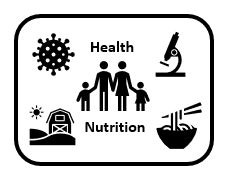Innovation and life or death impacts from policy decisions
Policy matters – support research, innovation, and intellectual property rights or falter and be left behind.
April 13, 2021

Think food security. Think COVID-19 vaccinations. Today we are seeing the dramatic impact policy decisions, that though likely taken with good intentions, are having horrendous impacts resulting in malnourishment and death as unintended consequences.
Ask yourself, or your government, or international intergovernmental organizations, do you support research and innovation? Do you encourage research? Do you reward innovation? Do you protect intellectual property rights? Or is innovation a public good? Or is innovation bad? And ultimately, who invests or pays for research?
We are seeing two major events play out in real life, food security or the lack of, and access to novel vaccines or the lack of. Maybe it is time to assess key factors causing this predicament. One must admit up front, the following is a perspective, and possibly oversimplified, some may agree, and some may disagree. Either way, one must recognize political policy decisions do have real life or death impacts.
The “2020 The State of Food Security and Nutrition in the World – Transforming Food Systems for Affordable Healthy Diets” report notes “… almost 690 million people in the world (8.9 percent of the world population) are estimated to have been undernourished in 2019.” And more recent reports suggest for 2020 the number of undernourished significantly increased. The World Health Organization (WHO) reports that globally, as of 2:37 pm CEST, 12 April 2021, there have been 135,646,617 confirmed cases of COVID-19, including 2,930,732 deaths, reported to WHO. Note, the WHO numbers are only representative of the extent of testing, tracking, and reporting, which is highly variable with major gaps globally. The undernourished and death numbers are a real concern in our globally connected world.
The recognized solution to undernourishment is food availability and the recognized solution to COVID-19 deaths is vaccination. Let us assess the framework around the solutions and note that research and innovation, and adoption of innovation, and the protection of intellectual property rights, are the solutions both for human nourishment and human health.
Food security: The developed world has an abundance of food due to historical investments in research and innovation and adoption of best practices. Genetic selection, biotechnology, animal health and nutrition management, and biosecurity each have contributed to the global food supply. Government policies supporting research, protecting intellectual property, and supporting adoption of best farming practices has yielded food for most all. Developing countries are beneficiaries, as evidenced by the green revolution. Global agriculture output has increased 60% over the past 40 years or growing at an average annual rate of about 1.63%.
Vaccinations: Vaccines have addressed the miseries of polio, smallpox, measles, mumps, rubella, tetanus, diphtheria, and pertussis. Millions of lives saved, and illnesses avoided. Government policies supporting scientific innovation has yielded amazing life-saving results addressing these diseases as well as cancer, bacterial infections, diabetes, and mental health.
Assessing the COVID-19 vaccine status, those countries supporting research and innovation and intellectual property rights, such as the United States, had the earliest approvals of vaccines, and supplies of vaccines. Countries that have not supported innovation and intellectual property rights are grappling for a vaccine and supplies of vaccines. Those taking the generic approach, or the public right and goods approach, are lacking a vaccine and a supply.
The harsh reality is that research and innovation are not free, and research takes time. The lack of investment in research, or protection of intellectual property rights, may yield exactly what one championed, nothing, a bare table or empty medicine cabinet.
The WHO recently posted, “we must make covid-19 vaccines, tests, and treatments available to all – it’s time to build a fairer healthier world for everyone everywhere.” (punctuation added). The post notes that health equity is the right way forward because germs do not respect borders, and they ask for equitable production and access.
The above mindset is very problematic, as someone needs to invest for anyone to reap the benefits. Globally, the old mindset of supporting research and innovation that resulted in the green revolution and cured human diseases, is being replaced by a new mindset of a public good with no reward for innovation, and the results are returning malnourishment or death as effects. Also, fearmongering remains rampant as many governments and food chain stakeholders still oppose innovation, such as biotechnology in food production, that has fed billions and resulted in zero deaths.
For, the United Nations, WHO and FAO, it may be time to adjust your approach. National governments, likewise, it may be time to adjust your policies. Support research and innovation and adoption of new technology. Protect intellectual property rights. Encourage and reward those that invest in research and innovation so all can benefit.
New innovative tools as gene editing, or CRISPR, and mRNA technologies have the potential to dramatically reduce malnourishment and improve human health. National and international efforts must align to support research in these and other areas of innovation.
In 2021, the United Nations seems to be at a crossroads in the human medicine and the food systems areas. WHO, maybe time to change course, seek to protect intellectual property rights for medicines, and encourage such by all countries, so that the private sector can leverage research and global manufacturing for the benefit of all. FAO, consider charting a course supporting research, innovation, and adoption of best practices at the forthcoming UN global food systems summit so farmers and consumers can benefit from a diversified nutritious animal- and plant-based diet.
Reflecting on 2020 and the beginning of 2021, those countries with policies that encouraged companies to invested in research and innovation and ensured protection of intellectual property rights benefited the earliest from the mRNA-based vaccines. Those countries with policies that decided medicines are a right or public good, still wait for the generosity of others. Analogies are the same when viewing agricultural research and innovation.
The tough reality is that governments and political leaders, in part due to political survival, are going to take care of their own citizens first whether that means a vaccine or food. It is extremely unlikely that any government or government leader will sacrifice their own country’s population for the benefit of another’s population. These actions are like that of a mother and father who are going to feed and care for their own child and family first.
Yes, the world is imperfect, but observationally governments and international intergovernmental organizations need to adjust policies now to incentivize research, protect intellectual property rights, and provide a path for economic success to those that invest for the betterment of our global society. Aligned global policies will result in global systems and supply chains that encourage investments, innovation, and international trade, all critical to meeting global needs for foods and medicines.
Yes, policy matters, thus support research, innovation, and intellectual property rights or falter and be left behind. Possibly an oversimplified assessment, but policy does have actual life and death impacts, and policy is a choice.
About the Author(s)
You May Also Like





